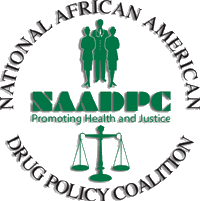| |
 |
| NAADPC-GLA EXECUTIVE COMMITTEES |
- The Executive Committee will essentially serve as the administrative and operational arm of the Local Coalition. It will consist of representatives from the local chapters of each of the member organizations of the National African American Drug Policy Coalition (NAADPC). All Executive Board members should also serve as members of one of the committees listed below. The purpose of this requirement is to ensure that the Executive Board operates in sync with the Local Coalition Committees and is in tune with the importance of the committees’ work. The Executive Board will have the responsibility of developing broad short and long term goals. This Board, however, should always consider the recommendations and expertise of each of the local coalition Committees. In addition, the Executive Board will be responsible for the administration and operation of the Coalition, including liaising with the National African American Drug Policy Coalition (NAADPC) and marketing the goals of the local coalition.
- The Policy Committee will serve as a catalyst to change the culture and attitudes of the community to individuals who have, in fact, recovered from illegal drug usage or alcoholism or who have re-entered society after serving time in prison, to influence more employers and businesses to employ them and to remove legal barriers to some occupations, to obtaining affordable housing, to access reasonable health care and transportation from residence to employment, thus removing obstacles which frequently influence individuals to continue to be recidivists and commit new crimes. This function also includes informing and educating legislators and other public policymakers on what is the best approach to resolving illegal drug usage and alcoholism in African American communities throughout the Nation.
- The Resources/Wraparound Services Committee will liaison with courts within its area which deal with a substantial number of minority individuals with illegal drug usage problems or binge drinking and alcoholism problems, to serve in an advisory capacity to judges and staff and to be a resource as to facilities, services and other resources in the community for treatment of such individuals as an alternative to incarceration, to provide mentors and monitors in the community, and to assist such individuals to adjust in the community so that they will not commit new crimes while in drug treatment or thereafter, but will become successfully rehabilitated.
- The Prevention/Mentoring will liaison with existing organizations to identify speakers to appear in panels to speak in middle and junior high schools as the primary focus, but in other schools as well, on the consequences of illegal drug usage not only from a legal perspective, but from a medical and health perspective as to adverse consequences on the human body, as well as impact on the psychological and emotional status of the individual and learning capacity. The Local Coalition Committee should discourage truancy and youth dropping out of schools by establishing a rewards system, which will provide internships and work study opportunities for Youth. They will also assist organizations with existing and new mentor programs in identifying African American male and female mentors for African American youth.
- Treatment Committee will assist in expanding treatment capacity. The committee will establish linkages with local and state agencies as well as local universities to provide training for court and treatment personnel, assist in the establishment of a local leadership committee comprised of the head of local agencies and private treatment providers to examine the gaps in treatment services for African Americans and work with the local community to ensure that all individual who desire treatment are provided access and resources to do so.
- Research Committee will assist in facilitating the goals of NAADPC by performing research and evaluation of programs as needed to determine program effectiveness. The committee will ensure that drug courts make necessary efforts to resolve potential barriers to participation and successful treatment outcomes – such as scheduling, transportation, funding, and childcare, by conducting necessary research and evaluation to adequately ascertain client needs. The committee will also, where information not available, will facilitate collaboration between local jails and prisons and local research centers or universities to conduct data analyses of inmate population to establish inmate substance abuse and treatment needs as well as inmates needs to effectively reintegrate back into the community. The Research Committee will also be responsible for the evaluation of the overall impact of the Local Coalition. This will include baseline and annual assessment of accomplishments.
>Back to Previous Page
|
|
|

